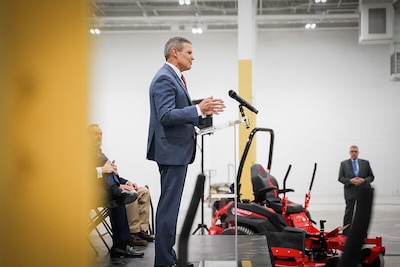Gov. Bill Lee said Thursday that his administration began reviewing Tennessee’s school safety policies and programs the day after an 18-year-old gunman walked into an elementary school in Uvalde, Texas, and killed 19 children and their two teachers.
“We will be taking steps in the days and weeks to come that will enhance our ability to secure students in the classroom,” said Lee, speaking with reporters for the first time since the May 24 massacre at Robb Elementary School.
Exactly what those steps will be is still being discussed. But Lee said they won’t involve repealing a bill he signed last year that allows most Tennessee adults to carry a handgun without a permit.
His top two priorities: make school campuses more secure and support mental health, especially for young people.
Lee has sought to strengthen both areas since taking office. In 2019, the new Republican governor raised the state’s annual investment in school safety funding, especially to increase the number of schools supported by law enforcement personnel known as school resource officers. And in 2021, he championed a $250 million mental health trust fund that dedicates annual investment income to support students’ emotional well-being.
He also expects school safety to be on the minds of legislators when they return to Nashville next January.
“There will be a long list of items that people will talk about and propose — one of them being whether to arm teachers, another being passing a red flag law,” Lee said. “I think we’re going to see a robust conversation all across America about what strategies to implement.”
Lee spoke with reporters in Fayetteville, Tennessee, after announcing that Wisconsin-based Ariens, a maker of commercial lawn mowers and snowblowers, will bring nearly 370 new jobs to build its products in the rural Middle Tennessee town.

Asked later by Chalkbeat about the Texas shooting, the governor characterized his office as “very engaged” on student safety.
“I’ve had very emotional conversations with parents who are afraid to send their children to school,” he said about how the shooting has shaken families and school communities anew.
A day earlier, about 50 pastors, parents, and physicians gathered outside of Lee’s office at the state Capitol to call for “common sense” gun control regulations. Among their demands: Ban semi-automatic assault weapons, armor piercing ammunition, and high-capacity magazines.
In Fayetteville, Lee answered five questions from Chalkbeat on gun violence and student safety. Chalkbeat lightly edited his answers for clarity and brevity.
Q: While the school year has ended, school safety is on the minds of Tennesseans after the Uvalde massacre. How are you working to prevent a similar tragedy here in Tennessee?
A: For three years, we have made investments, but we have to do more. From day one after that tragedy, we started an assessment of what has been done, and we’re developing a strategy. Part of the strategy is to make certain schools are using the resources that are available to them.
School resource officers are a key first step. A lot of accountability is necessary to make sure schools are actually carrying out established protocols, and that can be part of the SRO’s responsibility. We’ve learned that, in this event in Texas, a missed protocol or a lack of attention to detail can have tragic outcomes.
Q: After the 2018 mass shooting at a high school in Parkland, Florida, several Tennessee lawmakers proposed letting some teachers carry guns at school. The bills generally stalled, but there’s talk again of turning some teachers into armed security guards. Would you support such legislation?
A: I have said before that I would be in favor of a strategy that includes training and vetting and a very strategic and appropriate plan for (arming teachers). There are a lot of details that have to be right for that to be considered. But if lawmakers brought it forth, I would certainly consider it.
Q: Some of your critics have pointed to the 2021 “constitutional carry” bill you signed as part of the problem by allowing people 21 and older to carry handguns, openly or concealed, without a permit — all at a time when Tennessee has one of the nation’s highest rates of gun deaths. Was widening gun access the wrong direction?
A: Constitutional carry is a law that applies to law-abiding citizens. What we’re talking about in Texas was criminal behavior. Criminals don’t follow permit laws. They don’t follow gun laws. They break the law. Constitutional carry has nothing to do with criminals who break the law. In fact, when we passed constitutional carry, we also passed laws that strengthened penalties for those who broke the law with guns. It’s very important that we separate criminals who use guns in criminal activity and law-abiding citizens.
Q: What about limiting access to guns by people who are most likely to misuse them? Many are urging passage of red flag laws that permit police or family members to petition a court to order temporary removal of firearms when a person may present a danger to others or themselves.
A: That’s connected to mental health, but who is the arbiter of mental health? There are a lot of concerns about red flag laws — not only on issues of mental health but their effectiveness in general. Buffalo, New York (where another gunman killed 10 people on May 14) has red flag laws. So there’s just a lot of questions around those approaches.
Q: When it comes to support for mental health, Tennessee trails the rest of the nation. The state ranks 34th worst nationally for prevalence of mental illness and lower rates of access to care, and 40th for youth mental health, according to the 2022 report by Mental Health America, the nation’s leading community-based nonprofit for preventing mental illness. How are we bolstering mental health supports?
A: That is exactly why we established the mental health trust fund a few years ago. And our state’s new education funding formula actually strengthens our ability to tap into resources for mental health needs, for children in particular. The pandemic exacerbated all of the reasons why we need to be investing in these areas. So we have a commitment to investing in mental health resources and services across the state.
Marta W. Aldrich is a senior correspondent and covers the statehouse for Chalkbeat Tennessee. Contact her at maldrich@chalkbeat.org.






